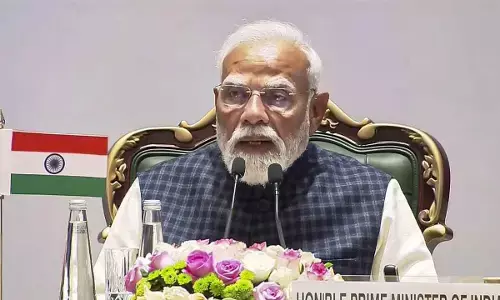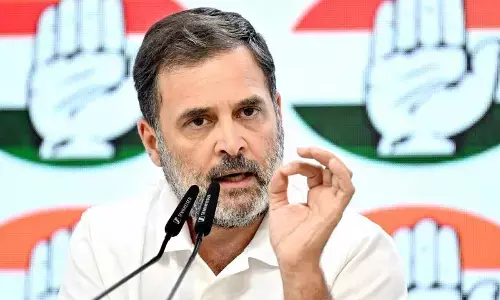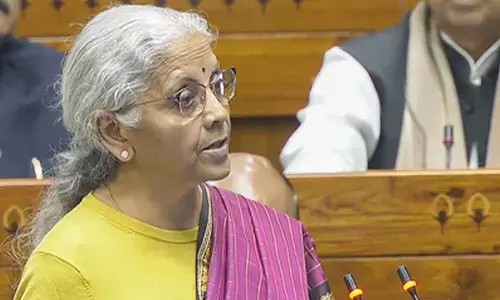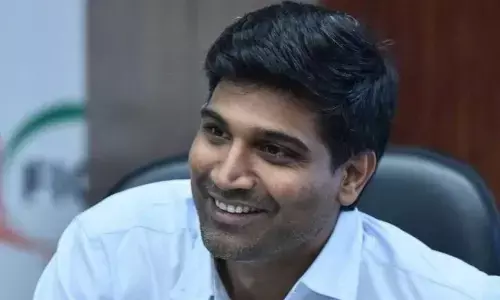After West Bengal, now Maharashtra mocks the Constitution

After West Bengal, now Maharashtra mocks the Constitution
As if to prove that two wrongs can make a wrong right, the Nationalist Congress Party (NCP) supremo Sharad Pawar has decided to continue the status of a Minister to Nawab Malik who has been in jail in a case slapped by the Enforcement Directorate (ED) on him.
As if to prove that two wrongs can make a wrong right, the Nationalist Congress Party (NCP) supremo Sharad Pawar has decided to continue the status of a Minister to Nawab Malik who has been in jail in a case slapped by the Enforcement Directorate (ED) on him. The reason given for doing so is the example of the West Bengal Chief Minister, Mamata Banerjee, who too, has not divested her jailed Ministers!
Sharad Pawar, in order to buttress his argument reportedly, said: "NCP will not succumb to BJP pressure and sack Malik, who is the face of the party in the State. It was a mistake that we sacked Anil Deshmukh, now we will not commit the same mistake." He further added: "We are following West Bengal CM Mamata Banerjee, who had rejected the proposal to dismiss a few cabinet members, who are in jail..."
Surely, such utterances by a seasoned politician like Pawar who has held the august posts of chief minister and a senior central minister, to say the least, deserve an all-round condemnation. Considering the tone and tenor of his above referred statements, it emerges that Nawab Malik shall not resign as a Minister because of the pressure from the BJP to do so. That taking resignation from Anil Deshmukh as the Home Minister was a mistake and now, Pawar has decided not to commit the mistake again and that in not asking the imprisoned Minister to resign the NCP is following the West Bengal chief minister Mamata Banerjee. Thus, Pawar nowhere gives a clean chit to Nawab Malik nor he even remotely contends that Malik has been framed by the Enforcement Directorate.
His justification in keeping Malik as a Minister without portfolio and making him eligible to draw public money towards salary and perks is that just because the BJP has been pressurising for Malik's resignation and the NCP will not succumb to such a demand. Another justification offered by Pawar is that since there is a precedence of West Bengal, he too, would follow the same. Pawar conveniently forgets the maxim that two wrongs do not make a right.
For an ordinary employee, the courts have ruled umpteen times that there shall be "No work, No pay". Then, why the same should not be followed in case of the ministers locked up in jails who obviously do not work as per oath taken under the Constitution. The oath undisputedly affirms the commitment to the Constitution and service of the people.
It is unfortunate that today's political leaders instead of sticking to the legal and moral obligations towards people prefer to seek shelter under phrases such as political vendetta, witch hunting and misusing the official machinery by the opponents' government. In fact, in public life, one has to be like Caesar's wife who always have to be above suspicion.
The snobbish interpretation of the Constitutional provisions often do more harm than good. Instead of interpreting the simple language of a Constitutional article as it ought to be , quite often the logic-defying cumbersome interpretation is offered by the bureaucracy and at times, even the judiciary. The President of India acting through the State Governor, for example, under Article 163 has ample powers to set right such an ugly situation. Similarly, the parliament being the supreme authority representing the people of India, is also not a helpless body. The makers of the Constitution, visionaries as they were, have provided a solution for each and every trying situation. The need is to use these provisions well in time to avoid mockery of the Constitution by the unscrupulous self-serving elements.
SC slams police for ignoring law
The Bench comprising Justice Ajay Rastogi and Justice AS Oka of the Supreme Court deprecated the practice of the police officer in over-stepping his jurisdiction and arresting a person without complying with Section 41 (A) of CrPC.
While disposing the Special Leave Petition (SLP) of one Jagdish Shrivastava against the State of Maharashtra and others, the Apex court relied on its earlier judgment in Arnesh Kumar Vs. State of Bihar (2014) 8 SCC 273 and directed the trial court to dispose of the post-arrest bail application of the petitioner/accused, if any, as expeditiously as possible.
Bombay HC terms a son's plea as laughable
Saying that a son does not have any right, title or settled and enforceable share in his parent's flats till they are alive, a Division Bench comprising Justice Gautam Patel and Madhav Jamdar rejected the son's plea that he being the son of his parents has a settled and enforceable share in the flats during the life time of the real owners i.e parents. "The fact that he is their son does not make either of their flats a shared household," the Bench said.
The petitioner, Asif, had filed an intervention application in his mother's (Sonia Khan) petition to be appointed as her husband's guardian for his person and property as her husband has been in a vegetative state for over a decade, has dementia and has suffered multiple strokes. The court allowed the petition of Sonia Fazal Khan and others with some safety riders.
Renewal of passport of accused
The Karnataka High Court by its judgement dated March 17 in Kasturi Rajupeta Vs Union of India has held that the permission of a trial court was not necessary for the renewal of passport when the proceedings in a criminal court were stayed by a higher court.
Allowing the writ petition, Justice Krishna S Dixit observed that the right to travel was an inviolable human right under Article 13 of the Universal Declaration of Human Rights. Further, the Constitution of India too, recognises the right to travel abroad as a facet of fundamental right to life and liberty guaranteed under Article 21.
Relying on the Apex court judgement in Chamundi Mopeds Vs Church of South India Trust 1992 (3)SCC 1, the court said, "Merely because a criminal proceeding is said to be pending, the obtainment of permission from the court concerned does not become imperative regardless of the circumstances."
P&H HC clarifies on Section 311(A) of CrPC
The Bench of Justice Sureshwar Thakur of the Punjab & Haryana High Court in a cheating and forgery case has clarified that the bare language of Section 311-A of CrPC makes it clear that no order for providing specimen signatures can be passed against the complainant-victim.
In the case titled, Sandeep Kaur and others Vs Union Territory, Chandigarh, the court further added that even an accused who hasn't been arrested or has been granted anticipatory bail, cannot be directed to give his specimen signatures.









